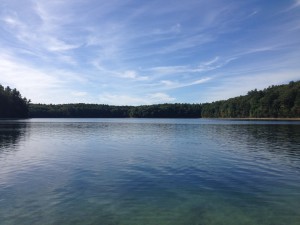I once read a book of case studies written by a psychiatrist. Among his many stories, he related one where a large group of school-age students mysteriously collapsed and fell ill when gathered in an auditorium. He described it as a case of mass hysteria, and talked at length about how easy it is in a large group setting for behavior to spread almost virally.
Although the definition and use of the term hysteria has changed significantly since this psychiatrist witnessed the incident, phenomena akin to what he described continue to this day. You only have to enter a college lecture hall before a midterm to experience a milder form of such an occurrence. While I wouldn’t call it mass hysteria (at least not without tongue-in-cheek), the tension and stress builds to exorbitantly palpable levels immediately before an exam. This certainly was the case before taking a neuroscience midterm yesterday, and it recurred between two exams earlier this morning. Yes, midterm season is upon us, and the amount of anxiety among friends and people I’ve spoken to has surged dramatically.
When I say this, I don’t mean to trivialize the experience that many students (myself included) feel before embarking on a major assessment. The mix of anxiety, dread, resignation, and perhaps even a little despair, derive from very genuine and significant concerns. Whether they come from not having studied until the night before, feeling unprepared despite studying, or worrying about the kinds of questions that will appear, these emotions are very, very real indeed. The fact that several dozen or hundreds of students in the same room may feel them at the same time often only amplifies them. Some people can draw energy from these stressful situations, and they can fuel and direct it toward the work that must be done. For many others, though, collective anxiety distracts from finding a steady state of mind, a calm that allows clarity of thought when the clock ticks, a term must come to mind to answer a question, and paragraphs must fill the pages of small, blue booklets.
Anxiety and stress can bring people together, and the saying “misery loves company” bears a lot of truth. Knowing that those who surround us also do not know what lies ahead can provide comfort and support, especially in the few minutes before an exam. Sometimes, however, finding a space to let go of one’s own worries can be comforting as well. This is true in our relationship with the divine and in worship as well, even though both lie in a very different realm from exam-taking. At least I hope they do, in that neither one creates copious amounts of stress and anxiety for us. No one entirely knows who the divine is, but sometimes we encounter it while in worship with a community, or in communion with those around us. The divine may appear in the ringing of the organ, the chanting of hymns, and the collective voice of all those gathered in prayer. But the divine can also appear in a soft whisper, when we are alone in a quiet space. Wherever we greet the divine, I hope that it can bring some comfort with it to face the unknown that lies ahead. May it help us to find calm amid anxiety, clarity among confusion, and peace among the turbulent exams and trials to come.
